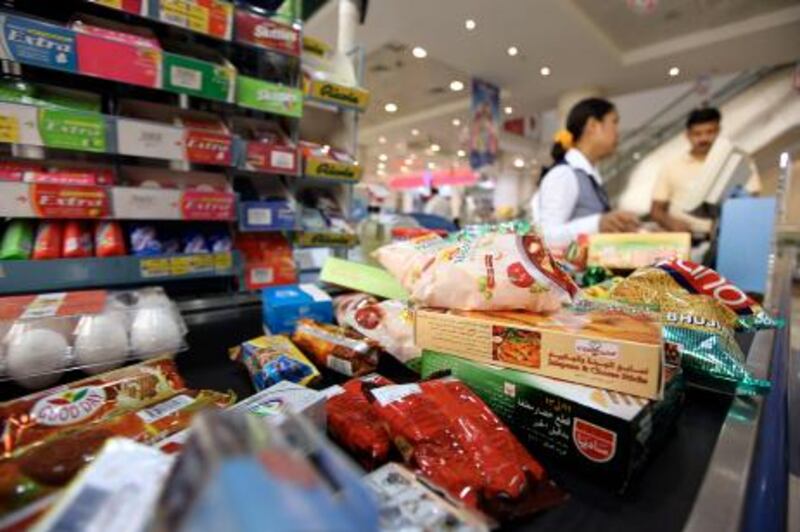Food prices in supermarkets across the UAE are now some of the lowest in the world, thanks in part to ongoing government controls introduced earlier this year.
Graphic:
The National's food price survey The National compares the cost of 40 goods in the UAE with their prices around the world. See the results here (PDF).
The UAE Government sought to protect consumers in May when it launched a campaign to freeze or reduce the prices of 400 basic commodities until the end of the year.
According to a comparison of prices by The National, the UAE prices are extremely competitive in relation to prices in markets such as the US, UK, Europe and Australia.
"I keep saying it again and again: although the majority of food is imported, the prices are very very low,' said V Nandakumar, a spokesman for LuLu Hypermarkets.
Prices of basic goods such as flour, bread, rice and pasta are in some cases 25 per cent lower at Carrefour in the UAE than at global supermarket peers such as Tesco in the UK, Coles in Australia, Safeway in the US and Carrefour in France. The National compared prices of nearly 40 branded and staple foods.
Carrefour, which is 75 per cent owned by the UAE company Majid Al Futtaim, is the biggest grocery retailer in the Emirates, according to Euromonitor International, an information consultancy. Carrefour Majid Al Futtaim declined to comment.
The findings are good news for consumers ahead of the festive period, but the lower prices have taken their toll this year on UAE supermarkets, which say price controls have eaten into margins and smaller players are at risk of going out of business.
"Naturally [the price controls] have to have had an effect on our margins," said Mr Nandakumar. "We have not done the final figures, but we will write it off as work in the community. We have done it because we thought we should and that it was right for the population."
The government campaign launched six months ago is also expected to continue into next year, despite a dip in global food prices, which were 10 per cent lower last month than the record high in February, according to the UNFood Price Index.
Outside the price controls, other factors are keeping prices lower across the Emirates, including negligible import duties, low logistical costs and inflation in other parts of the world.
As the last link in the supply chain, retailers are also being pinched, working with lower margins than their international peers while managing the price regulation.
Fred Watts, the operations director at Almaya Supermarket, says he has tried to manage stock and the supply chain to cut costs and make up for money lost in the price controls.
"The margins are definitely not what they used to be," he said. "We have just had to manage it to keep the business going and ride the storm. We have had to look to other areas to spread the costs out, and where we are losing margin on basic commodities, we make it up elsewhere."
Fazal Valiyaveetil, the purchasing manager at Fathima, a convenience supermarket with 15 outlets in Abu Dhabi, says the regulations have "drastically" reduced the company's profits.
"The profit margin has been totally reduced for the basic commodities. All the companies have the same pricing, but it has reduced our profits dramatically," he said. "Import prices have increased and our selling price has been reduced. That has been the problem."
He said margins have been reduced from about 2 per cent to less than 1 per cent because of the price controls.
"We have been given regulations to maintain the same selling price as 2011, so 2012 will be very, very tough," said Mr Valiyaveetil.
He added that the retailers were right to give back to the people by keeping prices low but said that some small businesses were in danger of shutting down, given the slim margins.
Fathima Supermarket was being kept afloat by the chain's other business interests, such as wholesale distribution, catering, construction and manufacturing, he said.
"People like us can survive, but small supermarkets, they will perish. Because we are part of a diversified business, we are still here," he said.
twitter: Follow our breaking business news and retweet to your followers. Follow us





